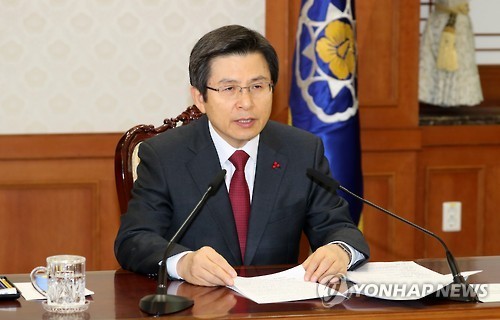Acting President and Prime Minister Hwang Kyo-ahn on Thursday called for tightened discipline among officials in the wake of a sexual harassment case involving a South Korean diplomat in Chile.
The diplomat has been accused of sexually harassing two teenage girls in the Latin American country. The case, which sparked public fury in both countries, came to light as a Chilean broadcaster recently aired its hidden camera coverage of him making improper physical contact with a teen.
"I call on each minister and vice minister to more strictly and thoroughly strengthen discipline in officialdom to ensure that such a case will never happen again," Hwang said during a meeting with Cabinet ministers on state affairs.
 |
Acting President and Prime Minister Hwang Kyo-ahn speaks during a meeting with Cabinet ministers at the central government complex in Seoul on Thursday. (Yonhap) |
"Such an unsavory act by public servants working overseas is a serious issue that has tarnished the image of the country and deeply frustrated citizens," he added.
Seoul's foreign ministry is expected to seek a heavy punishment against the embassy official in Chile in charge of cultural affairs. He returned home Tuesday and admitted to harassment charges during a two-day investigation by the ministry's audit team.
Hwang said that public servants must bear in mind that their deeds and words will not negatively affect the ongoing government efforts to tackle a series of pending issues, including the spread of avian influenza (AI).
As for AI, he ordered the mobilization of all available quarantine personnel, equipment and budget to quickly stem the spread of the disease that has ravaged chicken farms across the country since mid-November.
The acting president also urged the Cabinet ministers to prepare against the possibility of terrorist attacks, as he voiced concerns about this week's truck rampage in Berlin that killed 12 people. The Islamic State militant group claimed responsibility for the attack.
Later in the day, Hwang met with former top economic policymakers such as Lee Kyu-sung and Jin Nyum to hear their views on how to revitalize the economy.
Hwang stressed that he now prioritizes stabilizing state affairs, ensuring a robust defense and overcoming economic difficulties.
Participants highlighted the need for "preemptive and thorough" measures to tackle economic uncertainties stemming from potential policy changes under the incoming U.S. government, possible trade friction between the U.S. and China, and other factors. (Yonhap)







![[Today’s K-pop] Blackpink’s Jennie, Lisa invited to Coachella as solo acts](http://res.heraldm.com/phpwas/restmb_idxmake.php?idx=644&simg=/content/image/2024/11/21/20241121050099_0.jpg)